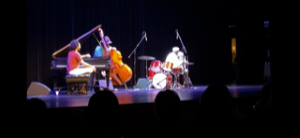Having attended, and also reviewed, several of the Eastern Music Festival‘s (EMF) concerts featuring students of the festival playing as the Young Artists Orchestra, I am struck and disappointed by the poor attendance – usually about half filled/empty. This, to me, reinforces the fact that unfortunately it is often name recognition that counts rather than the merit of the performer(s). While the faculty-filled Eastern Festival Orchestra, under the direction of Gerard Schwarz, becomes –in the five weeks of the festival – one of the great orchestras in the world, these student orchestras (ages 14-20) actually approach, and at times reach, that same performance level.
Thursday night’s program, presented at Dana Auditorium on the Guilford College campus in Greensboro, was a nicely programmed excursion into the musical tradition of three very different countries – and all without stepping into Western Europe! It began by remaining here at home in the U.S.A. with Aaron Copland’s Lincoln Portrait, for narrator and orchestra. Since being written as a response to the Japanese attack on Pearl Harbor, Copland’s unique creation has become the musical banner of patriotism and has been played thousands of times. Using the words of Abraham Lincoln, I find it somewhat ironic that until just a few weeks ago, the composer would not have enjoyed all the same rights so eloquently spoken of in this work.
Resident conductor Grant Cooper took a break from waving his baton to perform as narrator – the voice of the words of Lincoln. Missing from the program, plus no inserts that I saw, was the name of the young woman* who conducted with great skill and sensitivity. The orchestral woodwinds had some issues with the unanimity of attacks early on, but eventually became seamless. The strings played with great depth of character and gave us that distinctive “American” Copland sound. Like a concerto soloist awaiting his entrance, the narrator has quite a long time to sit until the orchestra finishes its introductory material. I found the volume of the microphone to be excessive and drowned out some beautiful and gentle passages. Cooper’s reading felt a bit too pre-programmed for my taste. This is Copland at his finest and most typical writing style, and this never fails to elicit the response that was undoubtedly planned: great reverence for the Great Emancipator, love of country, and a lump in your throat.
Unless you are a pianist or violinist, your choice of concertos written up through the early twentieth century for your instrument are mostly limited to a mere handful of high quality works. The cello is no different with the sublime Dvořák at the head of the class, two by Haydn, Schumann, Lalo and tonight’s work: Edward Elgar’s Cello Concerto in E minor, Op. 85. Cello soloist was Julian Schwarz, the young virtuoso who is also following in his father Gerard’s footprints by simultaneously pursuing a conducting career.
Elgar completed his only cello concerto in 1919, composed partially in response to the horrors of World War I. With many of his greatest compositions behind him, the public didn’t quite know what to make of this work that was quite different from his “hits.” Like Brahms’ monumental Piano Concerto No. 2, this work is, for concertos, uncharacteristically in four movements although in Elgar’s work some movements run together.
Schwarz played while perched on a typical cello platform, quite similar to that of the conductor’s. I was immediately struck by the enormous power and volume that Schwarz produced out of his instrument. It’s hard to tell whether it was the player’s technique, an unusually lively instrument or a combination of the two, but I have never heard such projection and force from a cello before. This allowed Schwarz to also be heard in quieter passages resulting in practically a new hearing of this well-known work. His playing was aggressive and strong when the music called for it but passionate and elegant in the heartbreaking adagio. Cooper guided the young orchestra with finesse and attention to detail with the result being a performance of the highest order. Schwarz returned for a stunning encore. This was a Baroque heavily ornamented Sarabande of great beauty and difficulty. For some reason he chose not to announce the work and I was unable to find out what it was.
When discussing works of Scandinavian and Icelandic composers, writers tend to resort to a clichéd collection of metaphors about frigid terrain, desolation and emptiness. While some of that may be appropriate, composers from those regions gave us a lot more than musical snow and ice. The big symphonic work to close this concert was the Symphony No. 1 in E minor, op. 39 by Jean Sibelius, universally recognized as Finland’s greatest composer. Completed in 1898 and premiered to great acclaim, despite its title as his first symphony, Sibelius had already written several quite long symphonic works. We get mixed messages from the composer as to whether this is programmatic music, but that is in the ear of the beholder anyway.
A gentle, graceful clarinet solo begins this vast and sprawling work, but it quickly emerges into a heroic statement at full volume. Cooper elicited a sense not only of technical mastery, but a degree of musical understanding way beyond the players’ years. After all, none of the orchestra could even legally buy a beer after the concert! The second movement contains a lovely, lyrical theme played with a darkly rich tone by the strings. The final two movements ratchet up the excitement to levels reminiscent of the great Romantic works but imbued with a distinctive and unique sound that sets Sibelius apart from that era. For those not familiar with the symphonies of Sibelius, this – and his second – are great places to start, on your travels through all seven.
*Noam Aviel conducted Lincoln Protrait. (added 7/27/15)











